Looking for the best solar panel for your RV Reliable Power Source ? Check out the top-rated Renogy 100 Watts 12 Volts Monocrystalline Solar Panel, known for its high efficiency and durability, making it a reliable power source for your RV adventures.
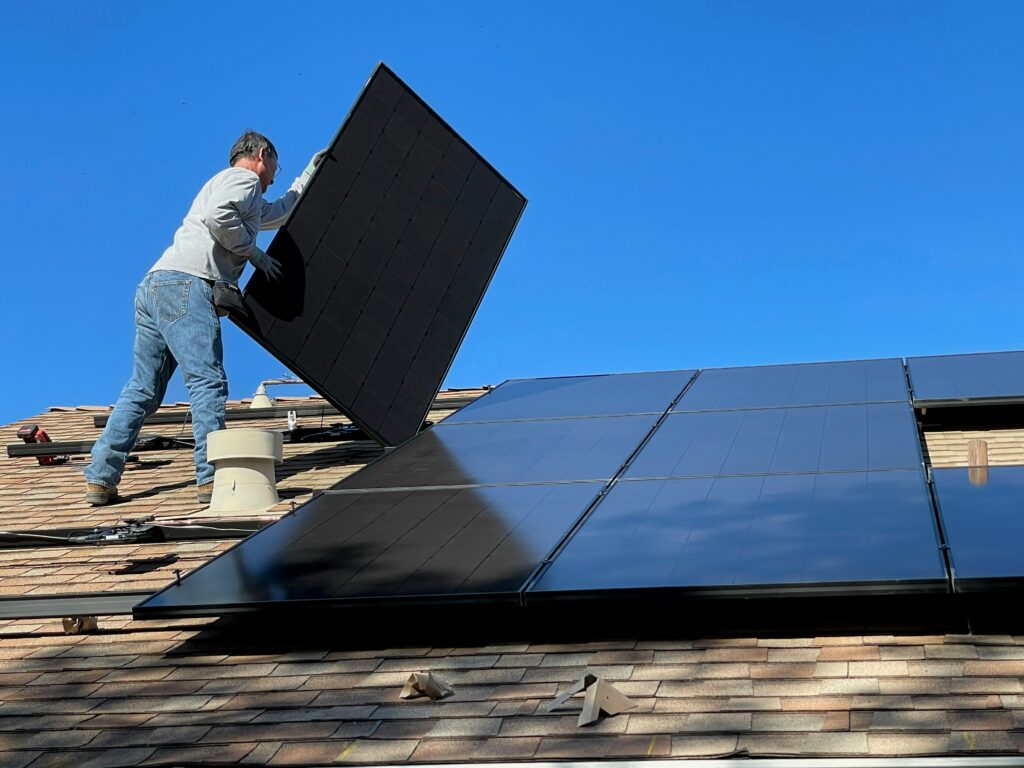
Selecting the best solar panel for a reliable power source involves considering several key factors such as efficiency, durability, warranty, and overall performance. Here’s a guide to help you choose the best solar panels available in the market:
1. Types of Solar Panels
1.1. Monocrystalline Panels
- Efficiency: High efficiency (15-22%) due to the pure silicon used.
- Durability: Long-lasting and often come with a 25-year warranty.
- Aesthetics: Uniform black color, which is often considered more aesthetically pleasing.
1.2. Polycrystalline Panels
- Efficiency: Moderate efficiency (13-17%).
- Cost: Generally cheaper than monocrystalline panels.
- Durability: Slightly less efficient but still durable with a similar lifespan.
1.3. Thin-Film Panels
- Flexibility: Lightweight and flexible, making them suitable for non-traditional installations.
- Efficiency: Lower efficiency (10-12%) compared to crystalline panels.
- Cost: Lower cost, but typically require more space for the same power output.
2. Key Considerations
2.1. Efficiency
- Higher Efficiency: Means more power output per square meter, ideal for limited space.
- Top Brands: SunPower, LG, and Panasonic are known for high-efficiency panels.
2.2. Durability and Warranty
- Long Lifespan: Look for panels with at least a 25-year performance warranty.
- Build Quality: Consider panels with robust construction to withstand environmental conditions.
2.3. Manufacturer Reputation
- Reliable Brands: Choose panels from manufacturers with a strong track record for quality and customer service.
2.4. Cost
- Budget: Balance initial costs with long-term savings and efficiency.
3. Top Solar Panels for Reliability
3.1. SunPower
- Model: SunPower Maxeon 5
- Efficiency: Up to 22.8%
- Warranty: 25-year complete system warranty.
- Features: Known for high efficiency, durability, and excellent performance in low-light conditions.
3.2. LG
- Model: LG NeON R
- Efficiency: Up to 22%
- Warranty: 25-year product and performance warranty.
- Features: High power output, attractive design, and robust construction.
3.3. Panasonic
- Model: Panasonic HIT N340
- Efficiency: Up to 20.3%
- Warranty: 25-year product and performance warranty.
- Features: Excellent temperature coefficient, maintaining efficiency in high temperatures.
3.4. REC
- Model: REC Alpha Series
- Efficiency: Up to 21.7%
- Warranty: 25-year product and performance warranty.
- Features: Strong performance in shaded conditions, high power density.
3.5. Q CELLS
- Model: Q.PEAK DUO-G6+
- Efficiency: Up to 20.6%
- Warranty: 25-year product and performance warranty.
- Features: Excellent efficiency, good price-to-performance ratio.
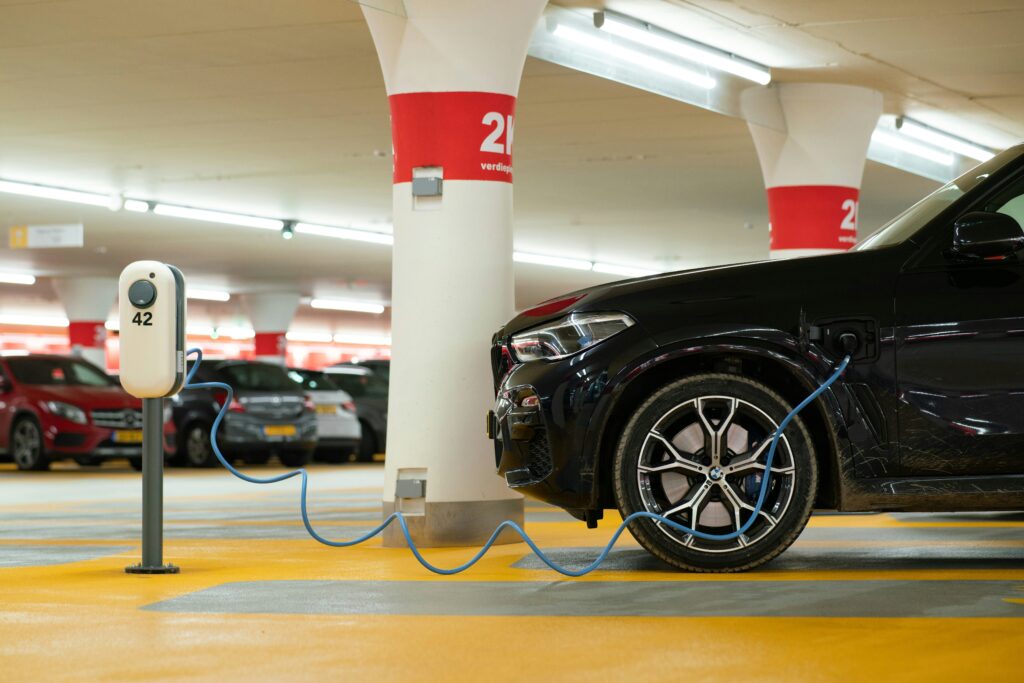
4. Installation and Maintenance
4.1. Professional Installation
- Ensure panels are installed by certified professionals to maximize efficiency and lifespan.
4.2. Regular Maintenance
- Clean panels regularly to maintain efficiency.
- Inspect for damage and wear, and address any issues promptly.
Embarking on RV travels means embracing the freedom of the open road, but it also requires reliable power sources. Solar panels are an excellent solution for off-grid power, allowing you to harness energy from the sun to charge your RV batteries and run appliances.
By selecting the right solar panel for your RV, you can ensure a constant and sustainable power supply for all your on-the-road needs. In this guide, we will explore the benefits of using solar panels for RVs, factors to consider when choosing the best solar panel, and review some of the top options available on the market.
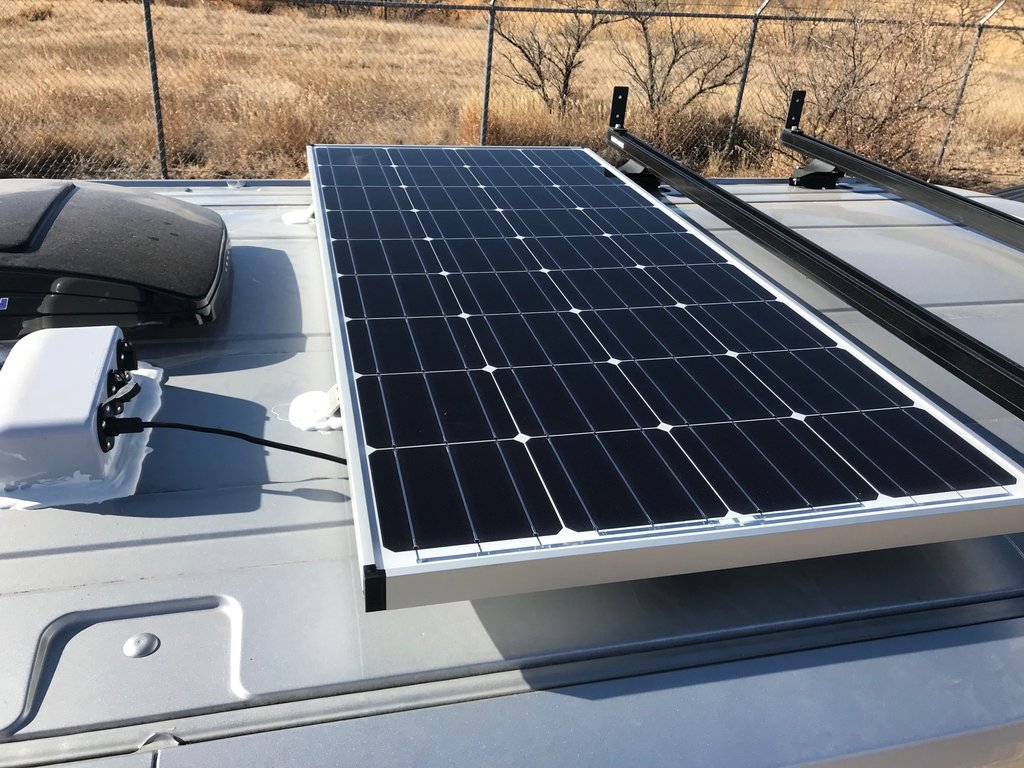
Credit: theroadtripguy.com
Top Solar Panels for RVs
Choosing the best solar panel for your RV to ensure a reliable power source involves considering several critical factors such as efficiency, durability, size, and ease of installation. Here are some of the top options along with important features to look for:
Looking for the best solar panel for your RV Reliable Power Source ?
1. Renogy 100 Watt 12 Volt Monocrystalline Solar Starter Kit
Features:
- Efficiency: High efficiency monocrystalline solar cells.
- Durability: Corrosion-resistant aluminum frame for extended outdoor use.
- Portability: Compact design suitable for RV rooftops.
- Ease of Installation: Comes with a complete kit including charge controller, mounting brackets, and necessary cables.
- Expandable: Easily expandable for higher power needs.
Pros:
- Reliable and widely used.
- Good balance between cost and performance.
- User-friendly installation with included instructions.
2. Go Power! GP-PSK-120 120W Portable Folding Solar Kit
Features:
- Efficiency: High-efficiency monocrystalline cells.
- Portability: Foldable and lightweight, perfect for portable use.
- Durability: Rugged construction suitable for outdoor environments.
- Ease of Use: Plug-and-play system with a built-in solar controller.
- Versatility: Can be used independently or connected to an RV’s battery system.
Pros:
- Excellent portability for RVs that move frequently.
- No permanent installation required.
- Quick setup and breakdown.
3. Zamp Solar 140-Watt Portable Solar Panel Kit
Features:
- Efficiency: High-efficiency monocrystalline solar cells.
- Durability: Robust construction with a sturdy frame and tempered glass.
- Ease of Use: Plug-and-play setup with built-in charge controller.
- Portability: Comes with a carrying case for easy transport.
Pros:
- High power output for its size.
- Reliable performance in various weather conditions.
- Portable and easy to set up.
4. HQST 100 Watt 12 Volt Polycrystalline Solar Panel
Features:
- Efficiency: Good efficiency with polycrystalline cells.
- Durability: Sturdy aluminum frame and tempered glass for long-term outdoor use.
- Cost-Effective: More affordable than monocrystalline panels.
- Installation: Pre-drilled holes for easy mounting and securing.
Pros:
- Cost-effective solution for RV solar power.
- Durable and weather-resistant.
- Easy to install and expand.
Key Features to Consider
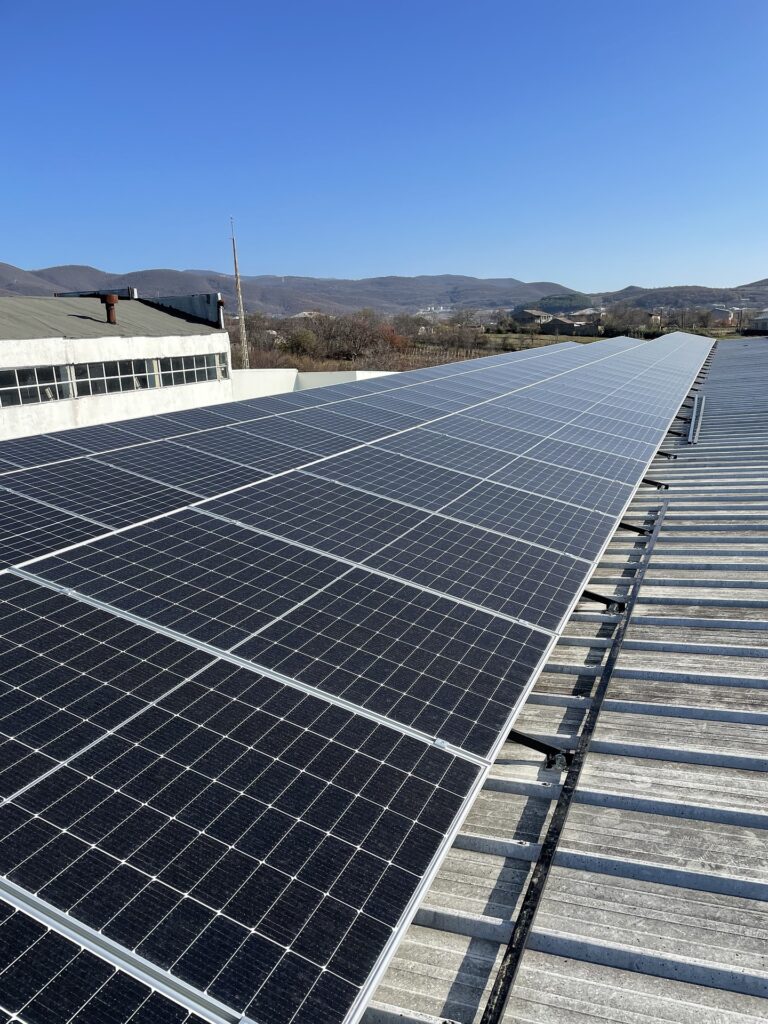
1. Efficiency
- High-Efficiency Panels: Opt for monocrystalline panels if you have limited space on your RV roof.
- Energy Output: Higher efficiency means more energy production, which is crucial for running multiple appliances.
2. Durability
- Weather Resistance: Ensure the panels can withstand various weather conditions, including rain, hail, and high winds.
- Frame Quality: Look for panels with corrosion-resistant frames and tempered glass.
3. Portability and Size
- Compact Design: Choose panels that fit well on your RV’s roof without taking up too much space.
- Portable Options: Consider foldable or portable solar kits if you prefer flexibility and ease of setup.
4. Ease of Installation
- Complete Kits: Kits that include charge controllers, mounting brackets, and necessary wiring simplify the installation process.
- User-Friendly: Look for panels with pre-drilled holes and clear installation instructions.
5. Expandability
- Scalability: Choose systems that allow you to add more panels in the future if your energy needs increase.
Importance Of Solar Panels For Rvs
Solar panels are increasingly popular for RVs, providing a reliable and sustainable energy source for travelers. Here’s a detailed look at the importance of solar panels for RVs:
1. Energy Independence
1.1. Off-Grid Capabilities
- Self-Sufficiency: Solar panels allow RV owners to generate their own electricity, reducing reliance on external power sources.
- Remote Locations: Perfect for boondocking or camping in remote areas without access to electrical hookups.
1.2. Continuous Power Supply
- Battery Charging: Solar panels continuously charge RV batteries during the day, ensuring a steady power supply even at night or during cloudy weather.
- Reduced Generator Use: Less dependence on noisy and fuel-consuming generators.
2. Cost Savings
2.1. Reduced Fuel Costs
- Generator Fuel: Lower fuel consumption by reducing the need for running generators.
- Campground Fees: Savings on campground fees for electric hookups.
2.2. Long-Term Investment
- Initial Investment: Although the initial cost of solar panels can be high, the long-term savings on fuel and campground fees make it a worthwhile investment.
- Low Maintenance Costs: Solar panels require minimal maintenance, further reducing long-term costs.
3. Environmental Benefits
3.1. Green Energy
- Renewable Source: Solar panels harness the sun’s energy, a renewable and abundant resource.
- Reduced Carbon Footprint: Decreases the reliance on fossil fuels, reducing the RV’s overall carbon footprint.
3.2. Silent Operation
- Noise Pollution: Solar panels operate silently, unlike generators, which can be noisy and disruptive.
4. Convenience and Comfort
4.1. Reliable Power Supply
- Consistent Power: Provides a consistent power supply for running appliances, lights, and other electronic devices.
- Battery Maintenance: Keeps batteries charged, extending their lifespan and performance.
4.2. Freedom and Flexibility
- Travel Flexibility: Allows RVers to travel and camp anywhere without worrying about finding electrical hookups.
- Extended Trips: Enables longer stays in remote areas without the need to return to powered sites.
5. Increased Resale Value
5.1. Market Appeal
- Desirable Feature: RVs equipped with solar panels are more attractive to buyers, increasing their market value.
- Modern Upgrade: Seen as a modern and eco-friendly upgrade, appealing to environmentally conscious buyers.
5.2. Investment Return
- Resale Boost: The initial investment in solar panels can often be recouped through the increased resale value of the RV.
6. Technological Advancements
6.1. Improved Efficiency
- Advanced Panels: Modern solar panels are more efficient, providing more power with less surface area.
- Flexible Options: Availability of flexible and lightweight panels that can be easily installed on various RV surfaces.
6.2. Smart Systems
- Monitoring and Control: Integration with smart systems that allow monitoring and controlling power usage remotely.
- Automatic Optimization: Systems that automatically optimize the power output and usage, enhancing efficiency.
7. Practical Applications
7.1. Running Appliances
- Kitchen Appliances: Powers fridges, microwaves, and other kitchen appliances.
- Electronics: Charges phones, laptops, and other electronic devices.
7.2. Comfort Features
- Heating and Cooling: Supports heating systems and fans for better climate control.
- Lighting: Provides ample lighting without draining the battery quickly.
Efficient Power Generation
RVs are vehicles designed for travel and adventure, and having a reliable power source is crucial during these journeys. Solar panels for RVs provide an efficient way to generate power that can fuel various appliances onboard, including lights, fans, refrigerators, and even air conditioning units. With solar panels, RV owners can rely less on traditional sources of energy, such as generators or grid connections, and enjoy the freedom of generating power wherever they are.
Eco-friendly Solution
Solar panels for RVs offer a clean and sustainable solution for powering your vehicle. They harness the energy from the sun, a renewable source that causes no pollution or harm to the environment. By using solar power, RV owners can reduce their carbon footprint and contribute to the global effort of combatting climate change. Embracing solar energy not only benefits the planet but also provides a sense of eco-consciousness, knowing that your travel adventures are powered by clean and renewable energy.
Factors To Consider When Choosing Solar Panels
When choosing solar panels, there are several important factors to consider to ensure you select the best option for your needs. Here’s a detailed guide:
1. Efficiency
1.1. Definition
- Efficiency refers to the percentage of sunlight that is converted into usable electricity by the solar panel.
1.2. Importance
- Higher efficiency panels produce more electricity in a given area, making them ideal for installations with limited space.
1.3. Typical Efficiency Ratings
- Monocrystalline Panels: 15-22%
- Polycrystalline Panels: 13-17%
- Thin-Film Panels: 10-12%
2. Cost
2.1. Initial Investment
- Consider the upfront cost of the panels, including installation and additional components such as inverters and mounting hardware.
2.2. Long-Term Savings
- Factor in the long-term savings on your electricity bills and potential increases in property value.
3. Durability and Warranty
3.1. Longevity
- Solar panels should be durable and able to withstand environmental conditions such as hail, wind, and snow.
3.2. Warranty
- Look for panels with a robust warranty, typically 25 years for product and performance guarantees.
4. Type of Solar Panel
4.1. Monocrystalline
- High efficiency and sleek appearance, but generally more expensive.
4.2. Polycrystalline
- Lower cost with slightly reduced efficiency.
4.3. Thin-Film
- Flexible and lightweight but less efficient and often require more space.
5. Manufacturer Reputation
5.1. Brand Reliability
- Choose panels from reputable manufacturers with a proven track record for quality and customer service.
5.2. Certifications
- Ensure the panels meet industry standards and certifications (e.g., IEC, UL).
6. Installation and Space
6.1. Roof or Ground Space
- Assess the available space for installation and choose panels that fit your space constraints.
6.2. Professional Installation
- Ensure that the panels can be installed by certified professionals in your area.
7. Performance in Different Conditions
7.1. Temperature Coefficient
- Indicates how well the panel performs in high temperatures. Lower coefficients are better for maintaining efficiency in hot climates.
7.2. Low-Light Performance
- Choose panels that perform well in low-light conditions if you live in a region with frequent cloudy or rainy weather.
8. Aesthetics
8.1. Panel Appearance
- Consider the color and appearance of the panels if aesthetics are important for your home or business.
9. Additional Features
9.1. Bifacial Panels
- Capture sunlight on both sides, increasing overall efficiency.
9.2. Smart Panels
- Integrated with microinverters or power optimizers to enhance performance monitoring and management.
10. Local Regulations and Incentives
10.1. Building Codes and Permits
- Ensure that the panels comply with local building codes and zoning regulations.
10.2. Incentives and Rebates
- Research available government incentives, rebates, and tax credits to reduce the overall cost.
11. Energy Needs
11.1. Current and Future Usage
- Assess your current energy consumption and consider future needs, such as additional appliances or an electric vehicle.
11.2. System Size
- Determine the size of the system needed to meet your energy requirements, typically measured in kilowatts (kW).
When choosing solar panels for your RV, there are several factors to consider to ensure you get the best fit for your specific needs. These factors include power output, size and weight, durability, installation, and compatibility.
Power Output
The power output of a solar panel is crucial to consider when selecting the best fit for your RV. It determines how much energy the panel can produce, which in turn affects the number of appliances and devices it can power. Look for panels with high wattage to ensure sufficient energy production for your needs.
Size And Weight
Considering the size and weight of the solar panel is essential, especially for RV applications where space is limited. Opt for compact, lightweight panels that can easily fit on the roof or other mounting locations without adding excessive weight to your vehicle.
Durability
Durability is critical for solar panels that will be exposed to the elements during RV travels. Look for panels with robust construction and weather-resistant materials to ensure they can withstand harsh conditions without compromising performance over time.
Installation
The ease of installation is an important factor to consider, especially for DIY enthusiasts. Choose solar panels that come with straightforward installation instructions and compatible mounting hardware to simplify the setup process and minimize the need for professional assistance.
Compatibility
Ensure the solar panel you choose is compatible with your RV’s electrical system and any existing solar components. This includes compatibility with charge controllers, inverters, and batteries to ensure seamless integration and optimal performance.
Top Solar Panel Brands For Rvs
Solar panels are an essential addition to any RV, providing a reliable source of sustainable energy. When it comes to equipping your RV with solar panels, choosing the right brand is crucial for ensuring efficiency and durability. In this guide, we’ll take a closer look at some of the top solar panel brands for RVs available on the market today.
Brand A
Brand A is renowned for its high-quality and efficient solar panels designed specifically for RVs. With a focus on durability and performance, Brand A offers a range of options to suit different RV sizes and energy needs. Their panels are known for their advanced technology and ability to withstand various weather conditions, making them a reliable choice for RV owners.
Brand B
When it comes to reliability and performance, Brand B stands out among the top solar panel brands for RVs. Their panels are designed to maximize energy output while maintaining durability and efficiency. Whether you’re boondocking off the grid or traveling in varying weather conditions, Brand B’s solar panels are equipped to handle the demands of RV living.
Brand C
Brand C is a popular choice among RV enthusiasts for its innovative solar panel solutions. Their panels are known for their versatility and adaptability, making them suitable for different types of RV setups. With a focus on user-friendly installation and maintenance, Brand C’s solar panels are ideal for RV owners looking for a hassle-free energy solution.
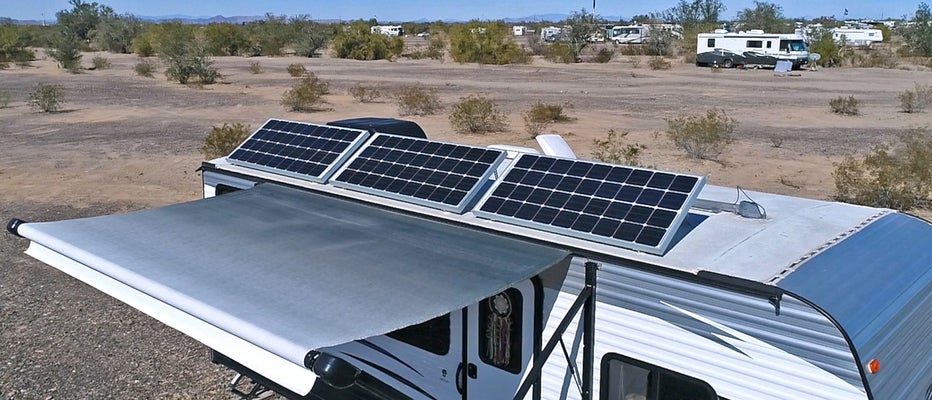
Credit: www.solarreviews.com
Features To Look For In Solar Panels
When selecting solar panels, it’s essential to consider several key features to ensure you get the best performance, durability, and return on investment. Here are the critical features to look for:
1. Efficiency
1.1. Conversion Efficiency
- High Efficiency: Look for panels with high conversion efficiency, which means they convert more sunlight into usable electricity. Typical efficiency ranges for various panels are:
- Monocrystalline: 15-22%
- Polycrystalline: 13-17%
- Thin-Film: 10-12%
2. Durability and Warranty
2.1. Product Warranty
- Length: Opt for panels with a product warranty of at least 25 years, which covers defects and failures.
2.2. Performance Warranty
- Degradation Rate: Ensure the performance warranty guarantees minimal degradation over time, often guaranteeing 80-90% of original output after 25 years.
3. Temperature Coefficient
3.1. Efficiency in High Temperatures
- Lower Coefficient: Choose panels with a low temperature coefficient (e.g., -0.3%/°C), indicating they will perform better in high temperatures.
4. Type of Solar Panel
4.1. Monocrystalline Panels
- Features: High efficiency, sleek appearance, better performance in low light conditions.
4.2. Polycrystalline Panels
- Features: Lower cost, decent efficiency, slightly lower performance in high heat compared to monocrystalline.
4.3. Thin-Film Panels
- Features: Lightweight, flexible, lower efficiency, suitable for large installations where space is not a constraint.
5. Manufacturer Reputation
5.1. Reliability
- Reputable Brands: Choose panels from manufacturers with a strong track record and positive customer reviews.
5.2. Certifications
- Standards Compliance: Ensure panels meet industry standards and certifications (e.g., IEC 61215, IEC 61730, UL 1703).
6. Power Output
6.1. Wattage
- Output Range: Select panels that offer high power output (wattage), typically ranging from 250W to 400W or more per panel.
7. Physical Size and Aesthetics
7.1. Dimensions
- Panel Size: Consider the physical size of the panels, ensuring they fit your installation area.
7.2. Appearance
- Aesthetic Appeal: Look for panels that match your aesthetic preferences, especially if they will be installed on a visible roof.
8. Panel Technology
8.1. Bifacial Panels
- Dual-Sided Generation: Bifacial panels can capture sunlight from both sides, increasing overall energy production.
8.2. Smart Panels
- Integrated Electronics: Panels with integrated microinverters or power optimizers offer better performance monitoring and management.
9. Frame and Build Quality
9.1. Frame Material
- Durability: Look for panels with sturdy, corrosion-resistant frames, typically made from aluminum.
9.2. Glass Quality
- Protective Layer: Ensure the panels have high-quality tempered glass to protect against environmental damage.
10. Installation and Compatibility
10.1. Mounting Options
- Versatility: Choose panels compatible with various mounting systems, whether roof-mounted, ground-mounted, or on specialized structures.
10.2. System Compatibility
- Inverters and Batteries: Ensure the panels are compatible with your chosen inverter and battery storage systems.
11. Cost and Financial Considerations
11.1. Price per Watt
- Cost Efficiency: Compare the price per watt of different panels to determine their cost-effectiveness.
11.2. Incentives and Rebates
- Financial Benefits: Consider any available government incentives, rebates, or tax credits that can reduce the overall cost.
When it comes to selecting the best solar panels for your RV, it’s important to consider several key features. These features can greatly affect the performance and durability of your solar panels, making a significant impact on the overall efficiency of your RV’s solar power system.
High Conversion Efficiency
One of the most important features to look for in solar panels is high conversion efficiency. This refers to the ability of the panels to convert sunlight into electricity efficiently. Panels with high conversion efficiency can generate more power from the same amount of sunlight, maximizing the energy output of your RV’s solar system. Look for solar panels with a high wattage output per square foot to ensure you get the most out of your investment.
Multiple Mounting Options
Another feature to consider is the availability of multiple mounting options. Different RVs may have different mounting requirements, so it’s important to choose solar panels that can be easily installed on various surfaces. Whether you need roof-mounted panels or panels that can be mounted on the ground, make sure the solar panels you select offer the versatility to meet your specific mounting needs.
Built-in Diode
A built-in diode is also an essential feature to look for in solar panels. This diode prevents reverse current flow, which can occur when shaded solar cells absorb power from other cells. Reverse current flow can significantly reduce the overall efficiency of your solar panels. By choosing solar panels with a built-in diode, you can prevent this issue and ensure that your panels are working at their maximum potential.
Weather Resistance
Lastly, it’s crucial to consider the weather resistance of the solar panels. RVs often encounter various weather conditions, including rain, wind, and extreme temperatures. Therefore, it’s essential to choose solar panels that are built to withstand these conditions. Look for panels with a durable construction and a high weather resistance rating, ensuring that they can endure the elements and continue to perform optimally for years to come.
Different Types Of Solar Panels For Rvs
There are different types of solar panels available for RVs, including monocrystalline, polycrystalline, and thin-film panels. Each type has its own advantages and considerations, so it’s important to choose the best solar panel for your specific RV setup and needs.
Consider factors such as efficiency, durability, and cost when making your selection.
When it comes to choosing the best solar panel for your RV, you have several options available. The most popular types of solar panels used in RVs are monocrystalline panels, polycrystalline panels, and thin-film panels. Each type has its own unique features and benefits, making it important to understand the differences before making your decision.
Monocrystalline Panels
Monocrystalline panels are known for their high efficiency and sleek appearance. These panels are made from a single crystal structure, typically silicon, which allows for better sunlight absorption. Due to their efficiency, monocrystalline panels are ideal for RV owners who have limited roof space but still want to generate a significant amount of power. They perform well in both low light conditions and high temperatures, making them a reliable option for all types of RV adventures.
Polycrystalline Panels
Polycrystalline panels, on the other hand, are made from multiple silicon crystals. They are slightly less efficient than monocrystalline panels but offer a more affordable price point. Polycrystalline panels are still a great choice for RV owners looking to harness solar power. They are durable, have a longer lifespan, and perform well in moderate sunlight conditions. If you have a larger roof space on your RV and cost is a deciding factor, polycrystalline panels might be the best option for you.
Thin-film Panels
Thin-film panels are lightweight and flexible, making them a versatile choice for RV owners. These panels are made by applying a thin layer of photovoltaic material onto a backing material. While thin-film panels are the least efficient compared to monocrystalline and polycrystalline panels, they have their advantages. Thin-film panels are less affected by high temperatures and shading, allowing them to perform better under less than ideal conditions. They are also significantly cheaper and can be easily installed on curved surfaces or areas with limited space on your RV.
Before choosing the best solar panel for your RV, consider factors such as your energy needs, available roof space, budget, and expected camping conditions. By understanding the differences between monocrystalline, polycrystalline, and thin-film panels, you can make an informed decision and enjoy the benefits of solar power on your RV adventures.
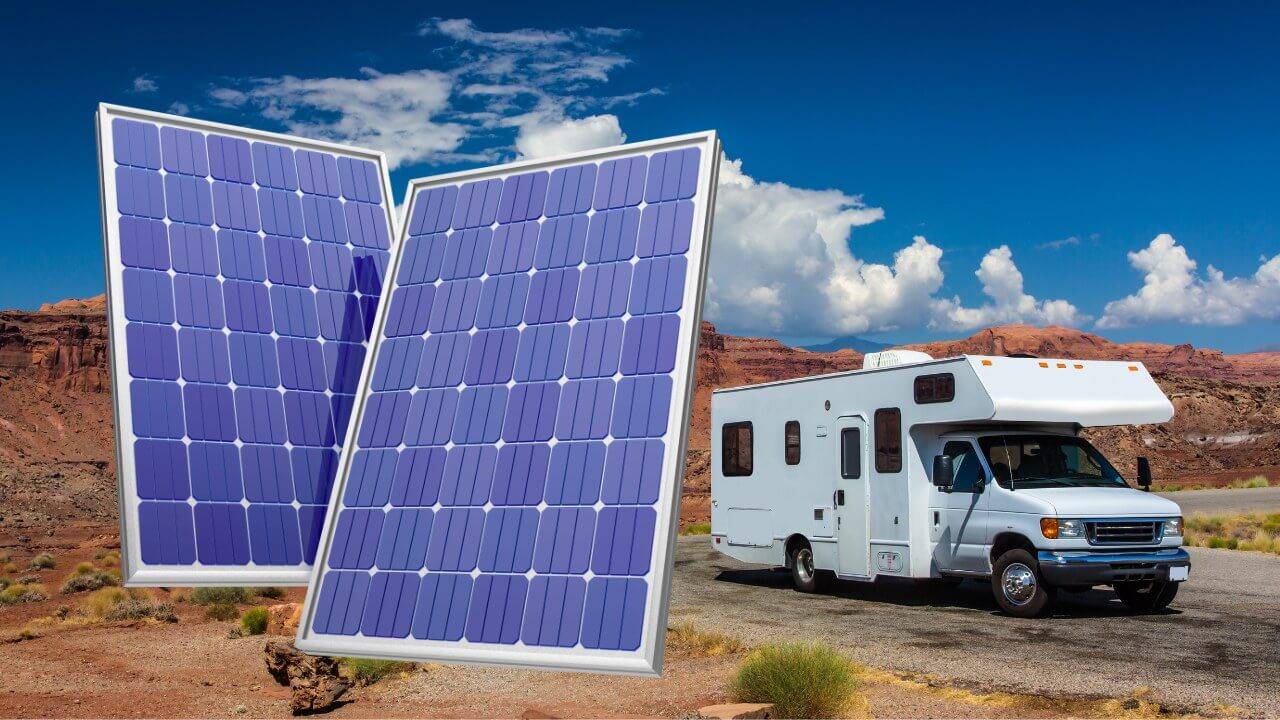
Credit: greencitizen.com
Installation Tips For Solar Panels On An Rv
Installing solar panels on your RV can be a game-changer when it comes to energy efficiency and self-sustainability on the road. However, it’s essential to follow the right installation tips to ensure that your solar panels work effectively and reliably. In this article, we’ll guide you through three crucial aspects of installing solar panels on an RV: choosing the right location, proper wiring and setup, and securing panels to the roof.
Choosing The Right Location
When installing solar panels on your RV, the location plays a vital role in maximizing energy production. Here are some key factors to consider:
- Sun Exposure: Install the panels in an area where they receive maximum sunlight exposure throughout the day. Avoid shaded areas or spots with obstacles like vents, antennas, or air conditioners.
- Tilt Angle: Set the tilt angle of the solar panels according to the latitude of your location. This will optimize the efficiency of the panels by maximizing their exposure to the sun.
- Aerodynamics and Clearance: Ensure that the panels are mounted securely and have ample clearance above the RV’s highest point to avoid any obstructions while driving or passing under low structures.
Proper Wiring And Setup
Efficient wiring and proper setup are critical for the overall performance and longevity of your RV solar panel system. Here are some tips:
- Battery Bank: Connect the solar panels to a battery bank using appropriate cables and connectors. It’s essential to choose the correct wiring gauge based on the current and distance between the panels and batteries to minimize power loss.
- Charge Controller: Install a charge controller between the solar panels and the battery bank to regulate the charging process and prevent overcharging. Ensure that the controller is compatible with the solar panel system’s voltage and current ratings.
- Inverter: If you plan to use AC-powered devices in your RV, consider installing an inverter to convert DC power from the battery bank into usable AC power. Select an inverter of the appropriate size and wattage based on your power requirements.
- System Monitoring: Consider integrating a solar panel monitoring system to keep track of the energy production, battery status, and overall system performance. This will help you identify and address any issues promptly.
Securing Panels To The Roof
Securing the solar panels properly to the roof of your RV is essential to prevent any damage or displacement during travel. Follow these guidelines for a secure installation:
- Mounting Hardware: Use high-quality mounting brackets, clamps, or adhesive pads specifically designed for RV solar panel installations. Ensure that they are compatible with your RV roof material and can withstand the vibrations and movements of the vehicle.
- Sealant: Apply a reliable, weatherproof sealant around the brackets or mounting points to prevent water infiltration. Regularly inspect and reapply the sealant as needed to maintain a watertight seal.
- Weight Distribution: Distribute the weight of the panels evenly across the roof to maintain stability and avoid undue stress on specific areas. Refer to your RV manufacturer’s guidelines for the maximum weight limit that the roof can safely accommodate.
- Cable Routing: Ensure that the cables from the solar panels are neatly routed and secured to avoid damage from wind, branches, or other external factors. Use cable clips or conduits to keep the wiring organized.
Benefits Of Investing In A High-quality Solar Panel
Investing in a high-quality solar panel for your RV brings numerous benefits. You can enjoy the freedom of off-grid living, reduce your carbon footprint, and potentially save on energy costs in the long run. With a reliable solar panel, you can power your RV appliances and devices, making your travels more sustainable and cost-effective.
Investing in a high-quality solar panel for your RV is a decision that brings with it a range of significant benefits. From ensuring a reliable power supply to reducing dependence on traditional fuel sources and experiencing long-term cost savings, a high-quality solar panel opens up a whole new world of possibilities for your RV adventures.
Reliable Power Supply
When traveling in your RV, having a reliable power supply is crucial for both comfort and practicality. A high-quality solar panel harnesses the power of the sun and converts it into electricity, providing you with a steady and dependable source of energy. This means that you can confidently power up your appliances, charge your devices, and enjoy the comfort of electricity wherever you go. Whether you’re camping in remote locations or embarking on extended road trips, a solar panel ensures that your power needs are met without any hassle or interruptions.
Reduced Dependence On Traditional Fuel Sources
By investing in a high-quality solar panel for your RV, you can significantly reduce your dependence on traditional fuel sources such as gasoline or diesel. Traditional fuel sources not only contribute to air pollution but also require frequent refueling, which can be both inconvenient and costly. Solar panels, on the other hand, utilize clean and renewable energy from the sun, making them an environmentally-friendly option that helps reduce your carbon footprint. With a solar panel powering your RV, you can enjoy a more sustainable and eco-friendly way of traveling, knowing that you are doing your part to preserve the planet for future generations.
Long-term Cost Savings
In addition to the environmental benefits, investing in a high-quality solar panel for your RV can lead to long-term cost savings. While the upfront cost of the solar panel might be higher compared to traditional power sources, the savings you accrue over time can more than make up for it. As solar energy is free, you won’t have to worry about rising fuel costs or fluctuating electricity rates. Moreover, many RV owners find that they can recoup their initial investment in a solar panel within a few years, thanks to the reduced reliance on traditional fuel sources. By harnessing the power of the sun, you can enjoy the freedom of unlimited energy without the added expenses.
So, if you are looking to enhance your RV experience, it’s clear that investing in a high-quality solar panel is a wise choice. With a reliable power supply, reduced dependence on traditional fuel sources, and long-term cost savings, you can truly make the most of your adventures on the road. Switch to solar power and embark on a journey that’s not only exciting but also sustainable.
Frequently Asked Questions Of Best Solar Panel For Rv
What Is The Best Solar Panel For An RV?
The best solar panel for an RV is the one that meets your energy needs and fits your budget. Consider factors like efficiency, size, and durability when making your choice.
How Many Solar Panels Do I Need For My RV?
The number of solar panels you need for your RV depends on your energy consumption. Calculate your daily energy usage and consider panel efficiency to determine the number of panels required.
How Do I Install Solar Panels On My RV?
To install solar panels on your RV, start by choosing the right location for mounting. Install brackets, connect the panels to a charge controller and the RV’s battery, and secure all connections.
Conclusion
To sum up, choosing the best solar panel for your RV is crucial for a seamless travel experience. With the right panel, you can enhance your energy efficiency, reduce your carbon footprint, and enjoy the freedom of off-grid adventures. Remember to consider the wattage, efficiency, durability, and ease of installation when making your decision.
Happy solar-powered travels!